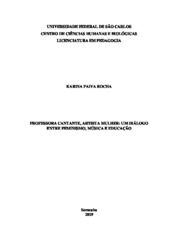| dc.contributor.author | Rocha, Karina Paiva | |
| dc.date.accessioned | 2021-06-13T17:46:10Z | |
| dc.date.available | 2021-06-13T17:46:10Z | |
| dc.date.issued | 2019-04-03 | |
| dc.identifier.citation | ROCHA, Karina Paiva. Professora cantante, artista mulher: um diálogo entre feminismo, música e educação. 2019. Trabalho de Conclusão de Curso (Graduação em Pedagogia) – Universidade Federal de São Carlos, Sorocaba, 2019. Disponível em: https://repositorio.ufscar.br/handle/ufscar/14370. | * |
| dc.identifier.uri | https://repositorio.ufscar.br/handle/ufscar/14370 | |
| dc.description.abstract | This research aimed to understand the project called Girls Rock Camp Brasil, which is a camp developed with girls between 7 and 17 years old in the city of Sorocaba, in the interior of São Paulo, knowing its contributions to the education of girls. The interest in this theme was born from the author's interest, as a Pedagogy student and singer, in creating interfaces between the fields of Education and Music, having the culture of feminism as an idea that permeates both, with values of equality and respect. Considering that the research addresses bibliographic analysis of non-formal education, music and feminism, its theoretical foundation sought to handle these matters. It had as main authors: Silva e Costa (2018), Alves e Pitanguy (1981), Beck e Guizzo (2003) and Brandão (1981) to understand feminism; Perosa (2006), Sapaterra (2012), Pimenta e França (2013) and Uriarte (2004) to understand how the education of girls happened and the music’s role in the Brazilian context; lastly, for reflecting about the music’s contribution to the transformation of society, including to feminism and to female emancipation, Vanda Bellard Freire (2010), Borges e Paz (2015), Sossmeier e Parizotto (2013), Saraiva (2013), Martins (2013), Araújo e Monastérios (2011), Gelain e Amaral (2017), Ribeiro et al. (2012) and Facchini (2011) were used. The results confirm that the camping promotes a field for reflection and transformation of the girls, allowing a fortification of their self-esteem, empowerment, as well as a greater union between them. In addition, it reveals that the camping helps the school environment where the girls are inserted, by collaborating with ideas of breaking the culture of sexism and encouraging mutual respect between boys and girls. | por |
| dc.description.sponsorship | Não recebi financiamento | por |
| dc.language.iso | por | por |
| dc.publisher | Universidade Federal de São Carlos | por |
| dc.rights | Attribution-NonCommercial-NoDerivs 3.0 Brazil | * |
| dc.rights.uri | http://creativecommons.org/licenses/by-nc-nd/3.0/br/ | * |
| dc.subject | Educação não formal | por |
| dc.subject | Non-formal education | por |
| dc.subject | Música | por |
| dc.subject | Music | por |
| dc.subject | Feminismo | por |
| dc.subject | Feminism | por |
| dc.title | Professora cantante, artista mulher: um diálogo entre feminismo, música e educação | por |
| dc.title.alternative | Singing teacher, female artist: a dialogue between feminism, music and education | por |
| dc.type | TCC | por |
| dc.contributor.advisor1 | Lombardi, Lucia Maria Salgado dos Santos | |
| dc.contributor.advisor1Lattes | http://lattes.cnpq.br/5697508831302188 | por |
| dc.description.resumo | A presente pesquisa teve por objetivo compreender o projeto chamado Girls Rock Camp Brasil, que é um acampamento desenvolvido com meninas entre 7 e 17 anos na cidade de Sorocaba, interior de São Paulo, conhecendo suas contribuições para a educação de meninas. O interesse por esta temática nasceu do interesse da autora, enquanto estudante de Pedagogia e cantora, em realizar interfaces entre os campos da Educação e da Música, tendo a cultura do feminismo como ideia que permeia ambos, com valores de igualdade e respeito. Tendo em vista que trata-se de uma pesquisa bibliográfica abordando a educação não formal, a música e o feminismo, sua fundamentação teórica procurou dar conta destes assuntos e teve como principais autores: Silva e Costa (2018), Alves e Pitanguy (1981), Beck e Guizzo (2003) e Brandão (1981) para compreender o feminismo; Perosa (2006), Sapaterra (2012), Pimenta e França (2013) e Uriarte (2004), para compreender como se deu a educação de meninas e o papel da música no contexto brasileiro e, para pensar sobre a contribuição da música na transformação da sociedade, incluindo no feminismo e na emancipação feminina, são utilizados Vanda Bellard Freire (2010), Borges e Paz (2015), Sossmeier e Parizotto (2013), Saraiva (2013), Martins (2013), Araújo e Monastérios (2011), Gelain e Amaral (2017), Ribeiro et al. (2012), Facchini (2011). Os resultados revelam que o acampamento promove um campo para reflexão e transformação das meninas, possibilitando um fortalecimento de sua autoestima, empoderamento, bem como maior união entre as mesmas. Além disso, observou-se que o acampamento contribui com o ambiente escolar onde elas estão inseridas, por colaborar com ideias de rompimento da cultura do sexismo e encorajando o respeito mútuo entre meninos e meninas. | por |
| dc.publisher.initials | UFSCar | por |
| dc.subject.cnpq | CIENCIAS HUMANAS::EDUCACAO::TOPICOS ESPECIFICOS DE EDUCACAO | por |
| dc.publisher.address | Câmpus Sorocaba | por |
| dc.contributor.authorlattes | http://lattes.cnpq.br/2348972208490178 | por |
| dc.publisher.course | Pedagogia - PedL-So | por |

